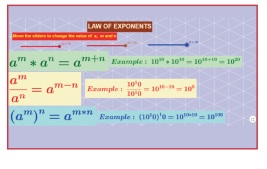Algebra | Term 2 Chapter 3 | 7th Maths - Summary | 7th Maths : Term 2 Unit 3 : Algebra
Chapter: 7th Maths : Term 2 Unit 3 : Algebra
Summary
DO YOU KNOW
Srinivasa Ramanujan, the great Indian mathematician
created so many beautiful equations in his childhood using exponents. Here is an
interesting exponential equation from his most popular “Notebooks”.

22 ×66 ×11×11 =33 ×33 ×44
The base and power are
equal in each factor.. Moreover the sum of base (or power) in both the sides are
also equal. (that is, 2 + 6 + 1 + 1 = 3 + 3 + 4 = 10) . It can be easily
proved with the help of laws of exponents.
LHS =22 ×66 ×11×11 =22 ×66 ×1=22 ×(2×3)6
= 22× 26×
36 [since, (a × b)m = a m × bm ]
= 22+6 × 33 + 33 [since, a m
× an = am +n ]
= 28 ×33 ×33
= 22×4 × 33 × 33
= ( 22 )4 × 33 × 33 [since, a m
×n = ( am)n ]
= 44 ×33 ×33 =33 ×33 ×44
= RHS.
Try to prove some of his
other equations given below:
88 × 99 × 11 = 33 × 33 × 1212 (Base total is 18)
44 × 2020 × 3030 × 11 = 66 × 2424 × 2525 (Base total is 55)
Summary
● If ‘a’ is any integer, then a × a × a × …
× a (n times) = an .
Here ‘a’ is the base and n is the exponent or power
or index.
● 
● When a number ‘a’ is multiplied
by itself, the product is called the square of that number
and denoted by a2 . Similarly, the square of a number (a2)
is multiplied by ‘a’, then the product is called the cube of that number
and is denoted by a3.
● If ‘a’ and ‘b’ are any
non-zero numbers and ‘m’ and ‘n’ are natural numbers, then
(i) am
× an = am +n (Product rule)
(ii) am
÷ an = am −n , m>n (Quotient
rule)
(iii) ( am )n =
am ×n (Power rule)
(iv) ( a ×
b)m = a m
× bm
(v) (a/b)
m = am /bm
●
For the base number whose unit digits are 0,1,5 and 6, the unit digit of a number corresponding
to any positive exponent remains unchanged.
● For base ending with 4, the unit digit
is 4 for odd power and is 6 for even power. Similarly, for
base ending with 9, the unit digit is 9 for odd power and is 1 for even power.
● The largest power of a variable in
an expression is called its degree. If it has more than
one variable, then one has to take the sum of the powers of variables in each term
and take the maximum of all these sums.
ICT Corner
Expected outcome

Step-1 : Open the Browser type the URL Link given below (or) Scan the QR Code. GeoGebra work sheet named “Algebra” will open. There is a work sheet named “Law of Exponents”
Step-2 : Move the sliders a, m and
n, observe the results and practice the laws.

Browse in the link
Algebra: https://www.geogebra.org/m/f4w7csup#material/ab5ra9uf
or Scan the QR Code.
Related Topics